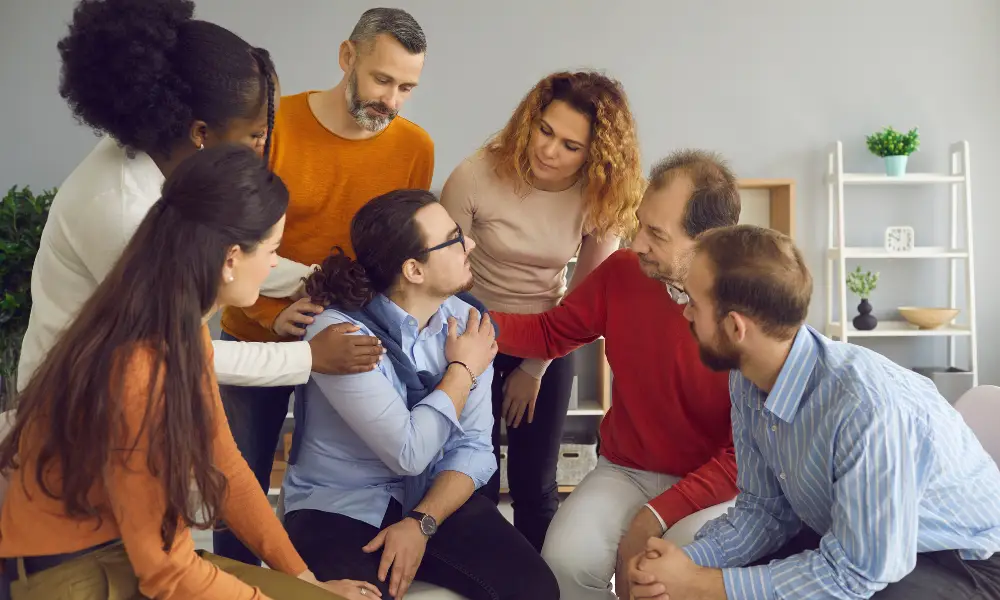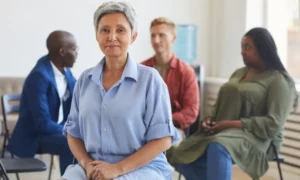Feeling isolated in your ADHD journey? You’re not alone, even if it sometimes feels that way. Many grapple with the challenges of ADHD, longing for understanding and a sense of community. What if there was a place where you could share, learn, and grow alongside others who truly get it? Welcome to the world of ADHD group therapy. In this blog, we’ll dive deep into how group therapy works, its myriad benefits, and why it might just be the missing link in your recovery journey. Let’s explore together.
Contents
What is ADHD Group Therapy?
 ADHD group therapy is a specialized form of therapeutic intervention where individuals with Attention-Deficit/Hyperactivity Disorder come together under the guidance of a trained therapist. Unlike individual therapy, which focuses on one-on-one interactions between the therapist and the patient, group therapy revolves around collective discussions, shared experiences, and mutual support.
ADHD group therapy is a specialized form of therapeutic intervention where individuals with Attention-Deficit/Hyperactivity Disorder come together under the guidance of a trained therapist. Unlike individual therapy, which focuses on one-on-one interactions between the therapist and the patient, group therapy revolves around collective discussions, shared experiences, and mutual support.
Here’s what sets it apart:
- Shared Experiences: Participants can relate to each other’s challenges, offering a unique sense of understanding and camaraderie.
- Diverse Perspectives: Each member brings their unique experiences, allowing for a range of solutions and coping strategies to be discussed.
- Enhanced Learning: Hearing multiple viewpoints can provide insights that might not emerge in individual sessions.
- Social Skills Building: The group setting naturally fosters the development of social skills, communication, and empathy.
- Cost-Effective: Group therapy can often be more affordable than individual sessions, making it accessible to more people.
While individual therapy offers deep personal introspection, group therapy provides a platform for collective growth, understanding, and mutual support, making it a valuable tool in the ADHD recovery journey.
Why Group Therapy for ADHD?
ADHD, while being a personal journey, has common threads that bind those who experience it. Group therapy leverages these shared experiences, offering a platform where individuals can gain strength from each other. Here are some compelling reasons to consider group therapy for ADHD:
- Shared Experiences: Listening to others narrate their struggles and successes can be affirming. It reminds participants they’re not alone in their journey.
- Mutual Understanding: There’s a profound sense of relief in being understood without having to explain oneself continually. Group members, having faced similar challenges, naturally offer this understanding.
- Peer Support: Sometimes, advice from someone who’s been in your shoes can be more impactful than reading a book or hearing it from a professional. Peer insights often resonate deeply.
- Accountability Partners: Having a group means having people who will check up on you, motivate you, and hold you accountable.
- Skill Development: Group settings can help in enhancing social interaction skills, offering practice in real-time communication, patience, and active listening.
In essence, group therapy not only provides therapeutic insights but also a community that becomes a pillar of strength and support for those with ADHD.
What A Typical Session Looks Like
 Venturing into the world of group therapy can be a blend of curiosity and nervousness, especially if you’re unsure about what to expect. Here’s a peek into a typical ADHD group therapy session:
Venturing into the world of group therapy can be a blend of curiosity and nervousness, especially if you’re unsure about what to expect. Here’s a peek into a typical ADHD group therapy session:
- Welcoming & Settling In: The session often starts with a warm welcome. Members gather in a circle, fostering an environment of equality and openness.
- Setting the Ground Rules: Especially for new members, therapists often reiterate the ground rules – confidentiality, respect, active listening, and non-judgmental attitudes.
- Check-ins: Members briefly share updates about their week, any progress or challenges faced. This sets the tone and helps gauge where each individual is at emotionally.
- Focused Discussions: The therapist might introduce a specific topic related to ADHD – such as coping mechanisms, challenges in daily life, or success stories. Members are encouraged to share their perspectives and experiences.
- Interactive Activities: These could be role-playing exercises, mindfulness practices, or other therapeutic activities tailored to address ADHD challenges.
- Skill-building Exercises: Activities aimed at building specific skills like time management, organization, or social interactions are often incorporated.
- Feedback & Sharing: Towards the end, members provide feedback about the session, ensuring continuous improvement and alignment with group needs.
- Wrapping Up & Homework: The session concludes with a summary, and sometimes, members might be given small tasks or ‘homework’ to practice skills or techniques discussed.
Every session is a blend of structure and spontaneity, tailored to the group’s dynamics and the individuals within it. What remains constant, however, is the emphasis on mutual respect, understanding, and shared growth.
What Activities Are Being Told To Calm ADHD?
 Managing ADHD doesn’t always involve medication or therapy sessions. Sometimes, simple activities can make a world of difference in calming the restless energy associated with ADHD. Here are some commonly recommended activities:
Managing ADHD doesn’t always involve medication or therapy sessions. Sometimes, simple activities can make a world of difference in calming the restless energy associated with ADHD. Here are some commonly recommended activities:
- Deep Breathing & Meditation: Taking deep breaths and practicing mindfulness meditation can help in calming the mind, increasing focus, and reducing impulsivity.
- Physical Exercise: Regular physical activity, whether it’s jogging, swimming, cycling, or even just walking, can help in releasing built-up energy and increasing concentration.
- Yoga: The gentle postures and breathing exercises in yoga can enhance focus and bring about a sense of tranquility.
- Listening to Music: Certain types of music, especially classical or calming tunes, can help in improving concentration and reducing hyperactivity.
- Art and Craft: Engaging in creative activities like drawing, painting, or crafting can be therapeutic and serve as an outlet for expression.
- Reading: Getting lost in a good book can be a wonderful way to divert the mind and improve attention span.
- Puzzles & Brain Games: Solving puzzles or playing games that challenge the brain can help in improving cognitive functions and attention.
- Nature Walks: Spending time in nature, whether it’s a park, forest, or beach, can have a calming effect and also help in grounding individuals with ADHD.
- Pet Therapy: Interacting with pets, especially dogs or cats, can bring about feelings of calmness and happiness.
- Journaling: Writing down thoughts, feelings, and daily experiences can be a way of venting out emotions and understanding oneself better.
It’s essential to remember that what works for one person might not necessarily work for another. Hence, experimenting with various activities and noting down what helps the most can be an effective approach to managing ADHD.
Challenges and How to Overcome Them
 Entering group therapy, especially for ADHD, can come with its own set of challenges. But here are tips on how to overcome them:
Entering group therapy, especially for ADHD, can come with its own set of challenges. But here are tips on how to overcome them:
- Fear of Being Judged: The idea of sharing personal experiences with strangers might seem daunting due to the fear of being judged or misunderstood.
- Solution: Remember that everyone in the group is there for similar reasons, and they are likely feeling the same apprehension.
- Difficulty Opening Up: Some individuals might find it challenging to talk about their experiences or emotions in a group setting.
- Solution: Take your time. You don’t need to share everything in your first session. As you become more comfortable with the group, opening up will become easier.
- Overwhelm from Others’ Stories: Listening to others can sometimes be overwhelming, especially if their experiences resonate with your own.
- Solution: If you feel overwhelmed, take deep breaths and ground yourself. If necessary, discuss your feelings with the group facilitator privately.
- Fear of Not Being Heard: In group settings, there’s a possibility that one might feel their voice is getting lost among others.
- Solution: Group therapy is structured to ensure everyone gets a chance to speak. If you feel overlooked, communicate your feelings to the therapist guiding the session.
- Worry About Confidentiality: Concerns about personal stories or experiences being shared outside the therapy room can be a barrier.
- Solution: Group therapy rules often emphasize confidentiality. Trust in the process and the professionalism of the therapist and group members.
- Reluctance Due to Past Experiences: A prior negative experience in group therapy might deter someone from trying it again.
- Solution: Consider discussing your past experiences with the therapist to tailor the approach better.
Understanding and anticipating these challenges can help individuals navigate group therapy more effectively. Remember, every challenge offers an opportunity for growth and self-discovery.
Will I Be Able To Manage ADHD After Therapy?
Absolutely! Group therapy provides numerous advantages that can pave the way for improved ADHD management:
- Shared Experiences: You’re not alone. Learn from others’ journeys and realize many face similar challenges.
- New Strategies: Discover practical tools and techniques to tackle ADHD symptoms.
- Boosted Confidence: Surround yourself with a supportive community, fostering self-assurance in your coping skills.
- Emotional Support: Shared stories and understanding can offer immense emotional relief.
- Accountability: Regular sessions provide a sense of responsibility towards one’s progress.
Incorporate these takeaways into daily life, and you’ll observe a transformative shift in managing ADHD post-therapy.
Tips To Select the Right Support Group Near You
 Choosing the right ADHD support group can be the difference between a transformative experience and an unfruitful one. To ensure you make the right choice, consider these factors and tips, keeping in mind that platforms like TherapyMantra can be a reliable guide in this journey:
Choosing the right ADHD support group can be the difference between a transformative experience and an unfruitful one. To ensure you make the right choice, consider these factors and tips, keeping in mind that platforms like TherapyMantra can be a reliable guide in this journey:
- Age Group: ADHD affects people differently across different age groups. Ensure the therapy group caters to the appropriate age bracket – be it children, teens, or adults.
- Type of ADHD: Not every ADHD is the same. Some groups may focus on inattentive type, while others might cater to the hyperactive-impulsive type. Find a group that aligns with your or your loved one’s specific ADHD type.
- Group Size: Some individuals prefer intimate groups where they can get more individualized attention, while others thrive in larger groups with diverse experiences.
- Tip: Platforms like TherapyMantra provide clear indications of group sizes, helping you choose as per your comfort.
- Therapist Credentials: The facilitator’s expertise can significantly impact the effectiveness of the group therapy. Ensure the therapist has the necessary qualifications and experience.
- Tip: TherapyMantra lists out the credentials of therapists, ensuring you’re in capable hands.
- Feedback and Reviews: Check reviews or ask for feedback from past attendees to gauge the effectiveness of the group therapy.
- Tip: TherapyMantra offers a feedback system where past participants share their experiences, aiding you in making an informed decision.
- Location and Format: While many opt for in-person sessions, online groups have become increasingly popular, especially for those who prefer the comfort of their homes or have busy schedules.
- Tip: TherapyMantra offers both in-person and online sessions, giving you the flexibility to choose.
In conclusion, selecting the right support group requires a bit of research and understanding of your specific needs.
In Conclusion
Navigating ADHD can sometimes feel overwhelming, but you don’t have to do it alone. With the right support and guidance, you can harness the tools and strategies to manage and even thrive with ADHD. Group therapy, with its shared experiences and mutual understanding, stands as a beacon of hope for many. Remember, every step you take towards understanding and managing ADHD is a leap towards a brighter, more fulfilled life. If you are experiencing ADHD related problems and are seeking guidance, Online ADHD Counseling at TherapyMantra is here to assist. Don’t hesitate. Book a trial Online therapy session today and embark on your journey towards healing and understanding.


